The name 'Junoon' came to me in a dream: Salman Ahmad
Guitarist Sufi Sal details emergence of Junoon and his reimagining of Pakistan with a docu-series on PM Imran.
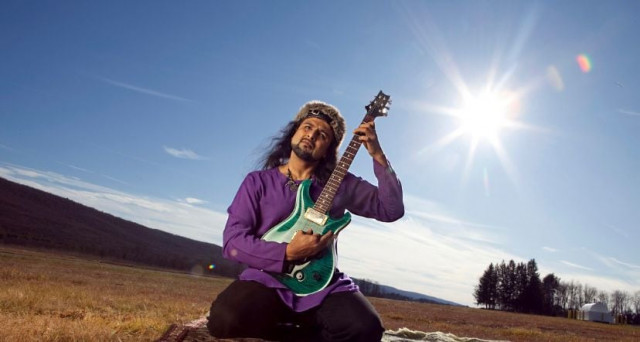
Juggling multiple interests after his recovery from Covid-19, Salman Ahmad sure knows how to rise from the ashes. But come what may the guitarist and Junoon founding member does not bite his tongue.
These days, Ahmad is giving finishing touches to his documentary series on the life of Prime Minister Imran Khan, titled Spiritual Democracy. What was a project long in the making is fueled by his decades-old friendship with Khan and a passion for bringing change in society.
“After my recovery from Covid-19, I immediately wanted to interview Khan because I saw how well Pakistan had coped during the first and second wave of Covid-19, compared to Iran, India and Bangladesh,” Ahmad recalled in a conversation with The Express Tribune.
1635230954-0/IMG_20211011_174445-(1)1635230954-0.jpg)
Donning a navy blue United Nations cap with a bright red jacket in Karachi’s sweltering heat, Ahmad constantly strummed on his acoustic guitar, refusing to put it down. It was apparent that after previously enjoying the discomfort of being a rebel with Junoon, Ahmad was aching in the comfort of his couch now.
“While India has a plethora of cultural figures that can be studied, Pakistan’s international image is tainted with allegations of breeding terrorists. So with 'Spiritual Democracy', my docu-series on PM Imran, I want to tell the world that not every practicing Muslim is Osama Bin Laden, some are like our PM.”
“As a UN ambassador and lecturer having spoken at Harvard and Yale, I have various students requesting me for material about Pakistan to study its cultural prowess. And while India has a plethora of cultural figures that can be studied, Pakistan’s international image is tainted with allegations of breeding terrorists,” remarked Ahmad. Thus, with Spiritual Democracy, Ahmad wants to “tell the world that not every practicing Muslim is Osama Bin Laden. Some are like our PM.”
The musician, who claims he opted out of Vital Signs because of their purported interest in making more songs like Dil Dil Pakistan, as opposed songs like Ehtesaab, also provided an explanation for his now change of direction. “All humans are affected by politics. Growing up in the States, I followed artists like John Lennon, who was a social activist-cum-artist. So I never wanted to settle for quintessential pop songs like Hawa Hawa. But I was always outvoted in Vital Signs,” lamented Ahmad, adamant on making music with a voice.
Recalling how Rohail Hyatt and Shahzad Hasan (Shahi) would often tell him to hold his thought because people would “beat us up if we sang Iqbal’s poetry,” Ahmad went on to intertwine social justice and music with Junoon, leading to its ban on PTV. “That was the only channel we had and it would always report ‘positive news’. So when Ehtasaab came out, we became traitors.”
“I think one needs to look at, what the person, who claims to stand for a particular cause, was up to before standing up for that cause became popular. And while we all can evolve, we need to speak our truth. With Imran Khan, I know I am speaking mine.”
Junoon was also courted for a controversy during their tour to India, when the Indian government was testing its nuclear arsenal. “I had given a statement saying, ‘there should be cultural fusion instead of nuclear fusion.’ We received a lot of backlash for that,” recalled Ahmad, laughing. “It is said, ‘say nothing, do nothing, be nothing.’ So I’ve never hesitated from speaking my mind.”
But now, Ahmad feels Pakistan has a chance to rewrite its narrative. Because while he is doing something he has condemned all his life, which is advocating for a ‘soft image,’ he feels he is speaking the truth. “I think one needs to look at, what the person, who claims to stand for a particular cause, was up to before standing up for that cause became popular. And while we all can evolve, we need to speak our truth. With Imran Khan, I know I am speaking mine.”
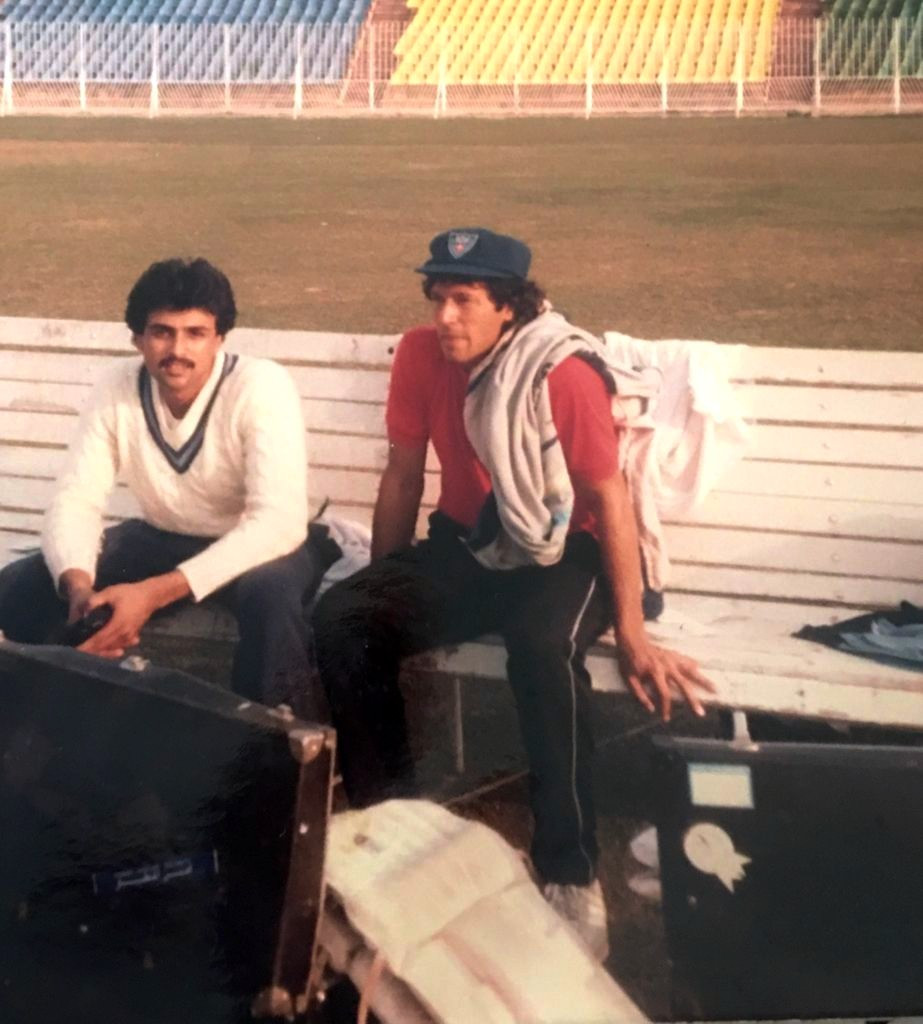
For Ahmad, 1985 was the beginning of him closely observing Khan’s leadership. After batting against him at the Lahore Gymkhana, Ahmad managed to score 64 runs. He then accompanied the Pakistan cricket team going to Bangladesh after. “Being the captain, Imran Khan called me when a player from the team got injured. It was then, that I saw Khan’s leadership, how he made everyone feel valued and like an integral part of one body. Fast forward to now, I still see the same qualities in him.”
“The name Junoon came to me in a dream. I left Vital Signs and naturally the best option was to go back to medicine. But then I had a dream in which I saw an old man clad in all white. He grabbed me by the shoulders and shook me saying, ‘you have Junoon in you.’ It was then that I realised how badly I wanted to tell young people to follow their heart.”
Khan, who spent most of his youth abroad, also reminded Ahmad of all the overseas Pakistanis who felt what he felt. “As an overseas Pakistani, I know that people think we can’t advocate for a leader without living under his governance. But while we can’t speak about internal affairs, we can talk about how Pakistan looks from afar,” he reserved. “For me, Pakistan is about its rich history, culture, and cricket. But that’s not the case for everyone. Overseas Pakistanis witness, first hand, the consequences of Pakistan’s negative image. And since we remit around 31 billion dollars to Pakistan each year, I think it’s only fair we get to participate in building its image.”
About the term ‘Spiritual Democracy,’ however, which has been explained by Khan in the first episode of the series released earlier in October, Ahmad maintained, “Back in the 90s, I read a lot of Allama Iqbal. It’s difficult to comprehend but that’s where I first came across the term. Then 10 years ago, Imran Khan made a speech in which he mentioned how he had a vision of spiritual democracy and that stuck with me.”
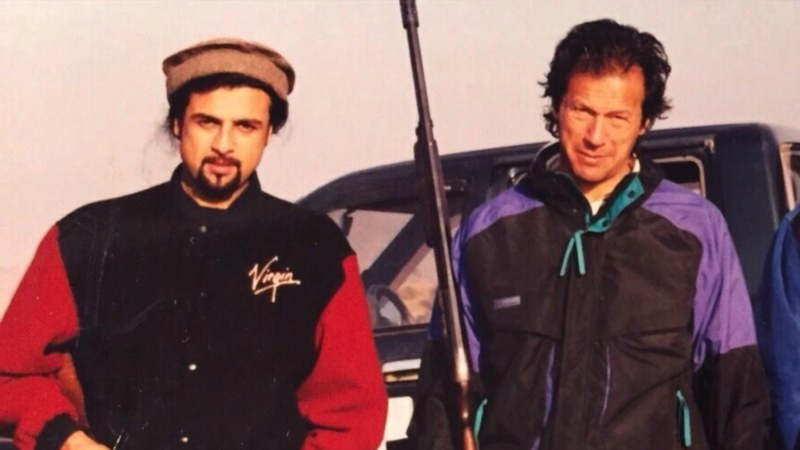
He also recalled why he named his band Junoon while starting out. “The name Junoon came to me in a dream. I left Vital Signs and naturally the best option was to go back to medicine. But then I had a dream in which I saw an old man clad in all white. He grabbed me by the shoulders and shook me saying, ‘you have Junoon in you.’ It was then that I realised how badly I wanted to tell young people to follow their heart.”
And as for the people condemning Ahmad’s use of the term Junoon to advertise his own gigs, as well as his apparent “lip synching” on Ali Azmat’s voice, Ahmad resorted, “To all the Twitter trolls, Brian, I and everyone in the band has been providing backing vocals for so many Junoon songs. And since I’ve written the songs, I feel I should have the right to sing them however I please. As far as the name is concerned, I have always had the trademark for it so I have the right to use it.”
Have something to add to the story? Share it in the comments below.

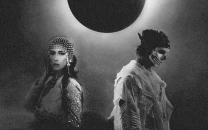
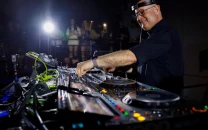


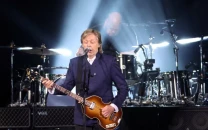
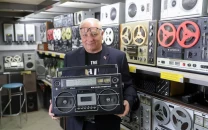












COMMENTS
Comments are moderated and generally will be posted if they are on-topic and not abusive.
For more information, please see our Comments FAQ